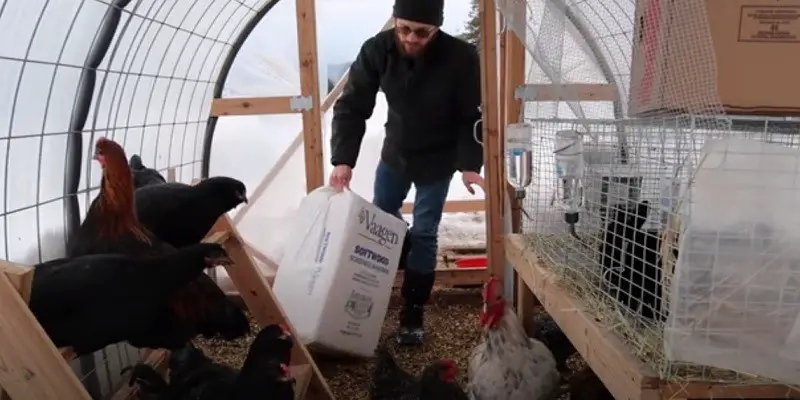Last Updated on April 23, 2025 by Pauline G. Carter
Yes, chicken coops can emit odors due to droppings and bedding. Proper maintenance and ventilation are crucial in minimizing the smell.
Keeping a clean and well-ventilated chicken coop is essential for a pleasant and healthy environment for both the chickens and their owners. Chicken droppings and soiled bedding can lead to a build-up of ammonia and other odors. Regular cleaning of the coop and changing the bedding, as well as ensuring good airflow, can help reduce the smell.
Additionally, using natural odor absorbers such as wood shavings or diatomaceous earth can further mitigate any unpleasant odors. By implementing these practices, it’s possible to minimize the smell associated with chicken coops, creating a more enjoyable setting for both the chickens and their caregivers.
Factors Contributing To Odor In Chicken Coops
Farmers and backyard chicken keepers often wonder if chicken coops smell. The truth is, chicken coops can develop unpleasant odors due to various factors. Understanding the factors contributing to odor in chicken coops is crucial for maintaining a clean and healthy environment for the birds as well as the caretakers.
Chicken Waste Management
Effective management of chicken waste plays a significant role in controlling the odor in chicken coops. Regular removal of manure and soiled bedding is essential. Using a proper waste disposal system, such as composting, can help reduce odor and provide a valuable fertilizer for gardens.
Ventilation And Air Circulation
Proper ventilation and air circulation are essential for minimizing coop odors. Good ventilation helps remove moisture and airborne particles that can contribute to odor. Fresh air intake and exhaust systems are vital for maintaining a clean and healthy coop environment. Consider installing windows, vents, or fans to facilitate airflow.
Bedding Material Selection
The choice of bedding materials can significantly impact coop odors. Absorbent materials such as straw, wood shavings, or hemp bedding can help soak up moisture and reduce odors. Regularly changing and adding fresh bedding can also contribute to keeping the coop smelling fresh and clean.
Implementing Odor Control Techniques
Proper Waste Disposal And Composting
Proper waste disposal and composting are essential for minimizing odors in a chicken coop. Instead of allowing waste to accumulate, establish a regular disposal routine. You can dispose of chicken waste in a compost pile to facilitate decomposition and reduce odor. Ensure that your compost pile is located away from the coop and follow the correct composting guidelines to keep the odors at bay.
Optimal Coop Cleaning Practices
Maintaining optimal coop cleaning practices is crucial for odor control. Regularly remove soiled bedding, droppings, and any uneaten food. A clean coop environment reduces the potential for odor buildup. Consider using natural and non-toxic cleaning agents to disinfect the coop without leaving chemical residues that contribute to foul smells.
Natural Odor Absorption Methods
Implementing natural odor absorption methods can effectively neutralize unpleasant odors within the coop. Consider using natural materials such as pine shavings or cedar chips in the coop. These materials have natural absorbent properties, aiding in odor control. Additionally, strategically placing natural odor-absorbing elements like charcoal or baking soda in the coop can help mitigate undesirable smells.

Credit: backyardpoultry.iamcountryside.com
Frequently Asked Questions For Do Chicken Coops Smell?
Do Chicken Coops Smell Bad?
Yes, chicken coops can produce odors, but proper cleaning and maintenance can minimize it.
How Often Should I Clean A Chicken Coop?
Regularly remove droppings and soiled bedding, ideally on a weekly basis, to keep odors at bay.
Can I Use Certain Materials To Reduce Coop Odor?
Materials such as pine shavings, straw, or a proper ventilation system can help control odors effectively.
What Are The Main Causes Of Coop Odor?
Droppings, wet bedding, and inadequate ventilation are the primary factors contributing to coop odor.
Are There Natural Remedies For Coop Odor Control?
Yes, using herbs like lavender and mint, or natural odor-absorbing materials, can help manage coop odors naturally.
Conclusion
In essence, chicken coops can develop a mild odor due to accumulated waste, but with proper maintenance, this can be mitigated. By implementing regular cleaning and proper ventilation, you can effectively minimize any potential smell. Ultimately, a well-maintained chicken coop can be a pleasant and sustainable addition to your property.

